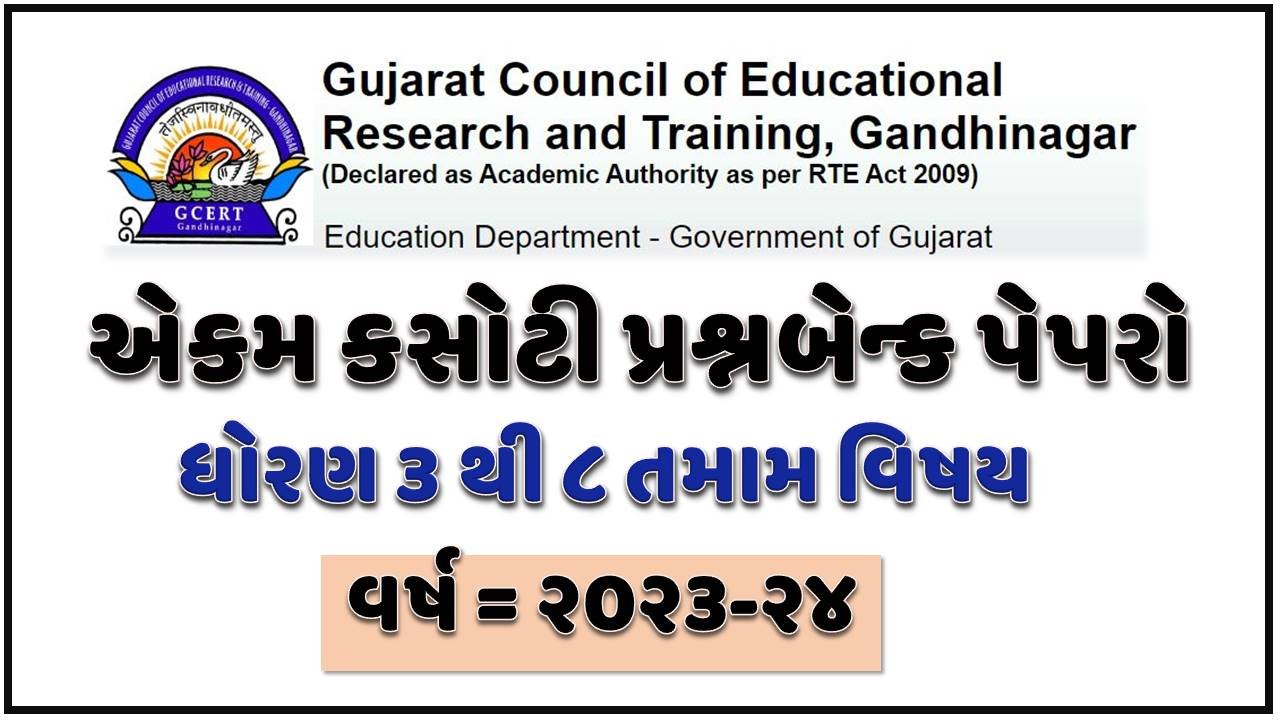STD 3 TO 8 PRASNBENK PAPER COLLECTION
In the realm of education, the efficacy of assessment methodologies is a perennial subject of debate. Among the myriad assessment tools, small unit tests stand out as indispensable components of a comprehensive evaluation system. These compact assessments, conducted at regular intervals throughout the academic term, serve multifaceted purposes that significantly enhance the learning process. From fostering retention of knowledge to promoting critical thinking skills, small unit tests play a pivotal role in shaping students’ academic journey. This essay explores the necessity and benefits of small unit tests in schools.
Firstly, small unit tests contribute to the reinforcement of learning. The human brain is predisposed to forget information over time unless it is revisited and reinforced. By administering frequent small tests covering specific units or topics, educators prompt students to revisit and consolidate their understanding regularly. This spaced repetition enhances retention and ensures that students do not simply memorize information temporarily but internalize it for long-term recall. Consequently, students develop a deeper and more enduring comprehension of the subject matter, laying a sturdy foundation for advanced learning. STD 3 TO 8 PRASNBENK PAPER COLLECTION
Moreover, small unit tests serve as diagnostic tools, enabling educators to gauge students’ comprehension levels accurately. Unlike comprehensive exams that may mask areas of weakness, small tests provide granular insights into students’ understanding of individual concepts. Identifying these areas of weakness early empowers educators to intervene promptly with targeted remedial measures, such as personalized instruction or additional practice exercises. This tailored support fosters a conducive learning environment where each student receives the guidance necessary to overcome their challenges effectively, thereby promoting academic progress.
ધોરણ ૩ થી ૮ વિષય- ગુજરાતી પ્રશ્નબેન્ક પેપર (૨૦૨૩-૨૪) CLICK HERE
STD 3 TO 8 PRASNBENK PAPER COLLECTION Furthermore, small unit tests foster the cultivation of essential academic skills, including critical thinking, problem-solving, and time management. Unlike passive learning methods such as lectures or reading assignments, tests require active engagement and application of knowledge. Students must analyze questions, recall relevant information, and formulate coherent responses within a limited timeframe. This process stimulates cognitive processes and hones students’ ability to think critically under pressure—a skill set invaluable not only in academic pursuits but also in real-world scenarios where quick decision-making is paramount.
Additionally, small unit tests promote accountability and motivation among students. The regularity of assessments creates a sense of accountability as students understand that their performance will be evaluated continuously. This awareness instills a proactive attitude towards learning, as students are motivated to stay on top of their studies and strive for consistent improvement. Moreover, the feedback loop inherent in small tests—where students receive prompt feedback on their performance—enables them to track their progress, identify areas for improvement, and set realistic goals. This process fosters a growth mindset, wherein setbacks are viewed as opportunities for learning and growth rather than insurmountable obstacles. STD 3 TO 8 PRASNBENK PAPER COLLECTION
Furthermore, small unit tests contribute to the cultivation of resilience and adaptability in students. Facing periodic assessments challenges students to confront setbacks and failures constructively. Through the iterative process of learning from mistakes, refining strategies, and persevering despite obstacles, students develop resilience—the ability to bounce back from setbacks stronger than before. Moreover, the dynamic nature of small tests, which cover a diverse range of topics and question formats, necessitates adaptability. Students learn to apply their knowledge flexibly in novel contexts, preparing them to navigate the complexities of an ever-changing world with confidence and agility.
Critics of small unit tests may argue that they prioritize rote memorization over genuine understanding and creativity. However, this criticism overlooks the nuanced role of small tests in the broader educational landscape. When designed thoughtfully, small tests can encompass a variety of question formats, including open-ended and application-based questions, which require students to demonstrate comprehensive understanding and analytical skills rather than mere regurgitation of facts. Moreover, small tests, when integrated into a well-rounded curriculum that emphasizes inquiry-based learning and experiential activities, complement rather than detract from the development of creativity and critical thinking skills.
STD 3 TO 8 PRASNBENK PAPER COLLECTION In conclusion, small unit tests constitute an indispensable facet of the educational ecosystem, serving as catalysts for learning, diagnostic tools for assessment, and catalysts for growth. By reinforcing learning, diagnosing areas of weakness, cultivating essential skills, fostering accountability and motivation, and nurturing resilience and adaptability, small tests empower students to embark on a journey of continuous improvement and lifelong learning. Therefore, educators and policymakers must recognize the intrinsic value of small tests and incorporate them judiciously into educational practices to maximize student success and fulfillment.



